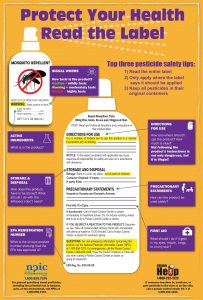ou might have noticed that we’re having a bit of a crisis with ticks and mosquitoes. They bite, they suck, and they can transmit pathogens to us during their feeding. One of the many things that we can do to avoid ticks and mosquitoes is to use repellents. But there are two important ideas to consider before picking a product from the shelf:
- Not every product has been proven effective, and
- The safety of a product depends on how you use it.
Product Efficacy

More than ever, an old adage reigns true: buyer beware! When it comes to tick and mosquito repellents, there are a number of products that claim to be effective—but offer no evidence or data to support the claim. This is especially true of many “natural” products with essential-oil active ingredients. Why? Products with essential-oil active ingredients don’t have to pass a scientific review by the U.S. Environmental Protection Agency (EPA) and can go to market without demonstrating that they work. These products give users a false sense of security that they are protected against biting insects when they are not. Learn more about this topic from our Tick FAQ section, What natural products can I use to repel ticks? For details on what products work, see the Insect Repellent Buying Guide from Consumer Reports
Product Safety and Use Restrictions: The Label Is the Law
As a pest management educator, I’ve said a million times, “the label is the law.” This is literally true—all labels of EPA registered products read, “It is a violation of Federal law to use this product in a manner inconsistent with its labeling.”
Here is a critical distinction about the products you might see on a shelf:
- Products with the active ingredient permethrin can actually kill ticks and mosquitoes. According to one label, “This product must not be applied to clothing while it is being worn. Under no circumstances should bare skin or clothing on the body be treated.” In other words, if you’re going to use permethrin, you have to treat your clothing or gear before you intend to use it so the pesticide can dry. According to the label on one product, this may be two to four hours.
- On the other hand, products with active ingredients DEET, picaridin, and IR3535 can be sprayed on clothing and skin to repel biting pests. These products work by masking the cues that make you smell tasty to mosquitoes and ticks. According to one label for these products, “Use just enough repellent to cover exposed skin… Do not use under clothing… Frequent reapplication and saturation is unnecessary for effectiveness.”
We want you to enjoy the outdoors—and we want you to do it safely. Both types of products can be used to protect you, your friends, and families from the bite of blood-feeding organisms. To further protect health, always read and follow label instructions.
For more information:
- Understanding Over the Counter Sprays for Mosquitoes and Ticks
- Minimize Tick Risk While Minimizing Pesticide Risk
- NYS IPM: How do I protect myself from ticks?
- Don’t Get Ticked New York
- For help reading a pesticide label, visit the National Pesticide Information Center.

Learn to read a pesticide label. Photo Credit: National Pesticide Information Center